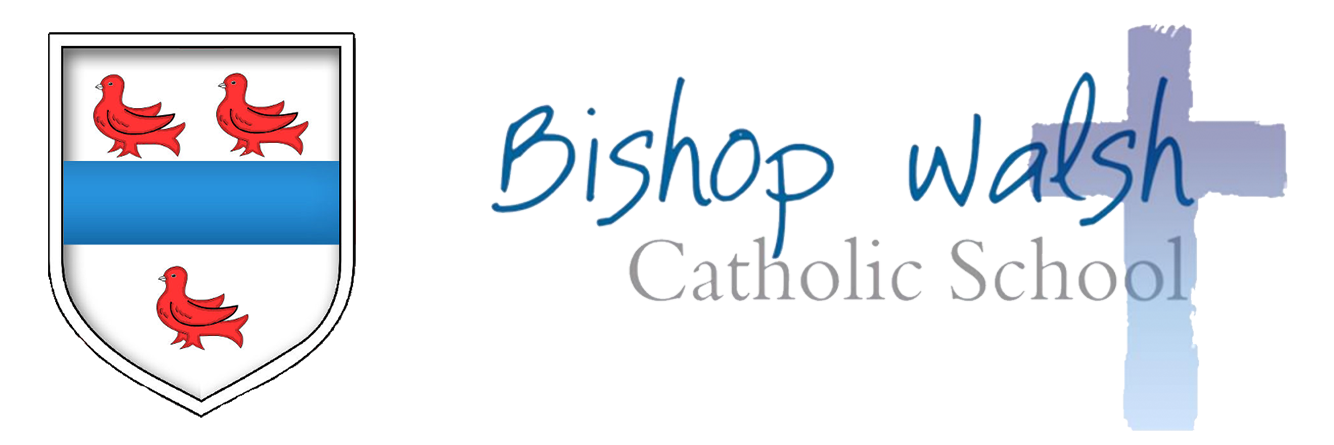Teaching & Learning
Mathematics
Reading List:
Maths for GCSE Textbook: Foundation (for the Grade 9-1 Course)
Maths for GCSE and IGCSE® Textbook, Higher (for the Grade 9-1 Course)
GCSE Maths Edexcel Complete Revision & Practice: Higher - Grade 9-1 Course
GCSE Maths Edexcel Revision Guide: Foundation - for the Grade 9-1 Course
Useful Websites:
KS3
Intent and Knowledge Entitlement:
Mathematics is essential in helping us to understand and change the modern World. It plays a vital role in so many aspects of life, providing a broad range of skills in problem solving, logical reasoning and flexible thinking. It is the aim of Bishop Walsh Catholic School to support every student to achieve their full potential and develop a deep understanding of Mathematics. The department offers a supportive environment focused on developing a culture of success and nurturing the individual.
At Bishop Walsh, our Key Stage 3 schemes reflect the key aspects of the National Curriculum for Mathematics. They enable students to become fluent in the fundamentals of mathematics through varied and frequent practice with increasingly complex problems over time. The experienced team of teachers strive to ensure that every student achieves their potential and develops a life-long love of learning.
Pupils are timetabled 7 hours of mathematics per fortnight in Year 7 and Year 8. Pupils are taught in mixed ability groups in years 7 & 8, although there is one smaller group giving pupils extra support. We follow a knowledge based curriculum, incorporating plenty of retrieval practice to enable pupils to develop their mathematical skills successfully. There are frequent quizzes and assessments at the end of each topic and throughout the year, to identify areas of development for each student. Students are provided with regular feedback and given the opportunity to securely embed a deep understanding of the topics covered.
Skills Entitlement:
By the end of key stage 3, pupils are expected to know, apply and understand the matters, skills and processes specified in the programme of study, building upon knowledge and skills from key stage 2. Pupils will have greater success in solving problems by applying their mathematics to a variety of routine and non-routine problems with increasing sophistication, including breaking down problems into a series of simpler steps and persevering in seeking solutions. The curriculum at Key Stage 3 is tailored to ensure that every student has the opportunity to reach their potential and provides them with a solid foundation to start their GCSE qualification.
KS4
Intent and Knowledge Entitlement:
The aim of the Key stage 4 Mathematics Curriculum at Bishop Walsh is to retain, deepen and extend student’s mathematical skills and understanding through the use of meaningful and relevant problems. Students will build on learning from Key Stage 3 to further develop their mathematical skills and apply these not only in their Maths lessons but also wherever relevant in other subjects and in day to day contexts. This will provide them with a foundation for understanding the world and the mathematical demands and varied contexts that they might face when leaving school. Students cover a wide range of topics at keys stage 4 which all fall under the categories of Number, Algebra, Shape and Measure, Statistics and Probability and Ratio and Proportion. The scheme of work also builds in a number of opportunities for revision of key topics to ensure that pupils can build on previous work successfully as well as recall their skills and knowledge for examinations.
Students in Keys stage 4 all study for the GCSE Mathematics qualification with EDEXCEL where they will sit either the higher or foundation tier paper at the end of Year 11 . A small number of students will also study for the OCR Free standing Maths qualification. This course is designed to challenge our most able mathematicians and provides candidates with an introduction to the mathematics studied post-16, including GCE Mathematics and Further Mathematics.
Skills Entitlement:
By the end of Key stage 4 pupils will be able to demonstrate a deeper understanding of mathematical concepts. Pupils will be confident, secure and fluent in interpreting diagrams and solutions and they will be able to approach problems systematically and choose appropriate techniques for their solution. They will be able to independently apply, interpret and evaluate their solution to complex problems. We hope that our students will finish year 11 confident in their ability to relate their knowledge to real life contexts and perform the basic mathematical skills needed in his/her chosen career or for entry to higher or further mathematical education.

